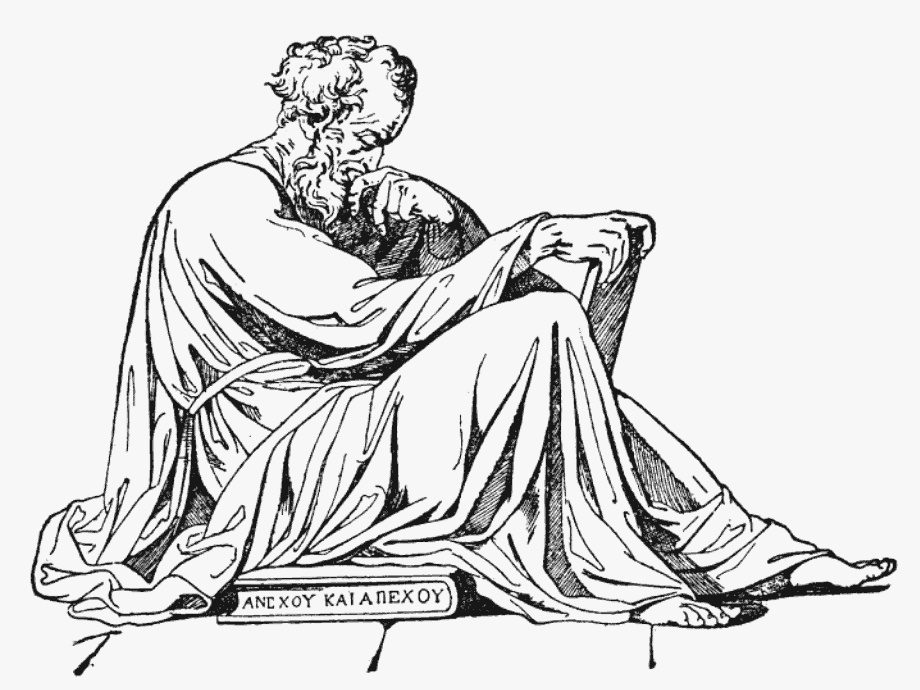
Epictetus is a late Stoic philosopher who lived around 50-138 AD, his philosophy emphasizes practical wisdom. And his questions revolve around “What is a good life?.” Epictetus was a slave to one of Nero’s bodyguards, who found his way to freedom. And Eventually established himself as one of history’s most unique thinkers.
One Of The Founding Fathers Of Stoicism:
Epictetus started the school with one of his students Arrian who, on the basis of their lectures, compiled eight books of conversations (Discourses), and published a small teaching manual (Enchiridion). In them they explored the relationship of the principles that lead to freedom from suffering.
In his work Epictetus emphasized that every human being is capable of virtue, and that God provides everyone a chance to be happy. He believed that all men can build lasting character, which paves the road to self-mastery.
More importantly, he concluded that most people are able to build a moral life based on initial insights. This meant that people can be taught about virtue, and about right or wrong. So this is why he considered philosophy a training tool for the mind, which develops purity, clarity and happiness.
Therefore, it can be concluded that philosophy is important because it can teach us about “good” and “evil”. We all know about the two concepts, yet we don’t really think about our decision making until it’s usually too late. This is why we can get confused, unable to bring about the right decisions when the moral choices have to be made.
Therefore, it’s imperative that we learn the value of logic and reason. Epictetus also thought that education is a “must” for everyone who wants to lead a virtuous life. Which mainly consisted of two branches. The first one is to learn how to apply innate beliefs to specific situations, and the other one is to learn how to separate things we can control, and the things we can’t.
Learn About What You Can Control, And What You Can’t Control.
To differentiate the two types of actions (those which are in our power, and those outside our reach) is a skill valued by all Stoics. Because, if we’re capable of virtuous differentiation, then we are free, since our well being is no longer influenced by outer events.
Events that we cannot control are numerous. We can’t control how others perceive us, and we can’t control if people we love die, or how and when we may get sick. Also, we can’t control the behavior of other people, especially their moods, and feelings.
In summary, there are many situations in which we may feel powerless. Therefore, it’s deemed logical that individuals shouldn’t long for things. Nor should they fear them, because then they would be handing over their power to things outside their control.
Everything that happens should be ascribed to God or fate. The universe is basically indifferent to our existence, fears, hopes, victories and dreams. This means that the only thing we have control over is our minds, more specifically how our minds choose to perceive external events.
They Key To Happiness Lies In Perception
Epictetus thought that our happiness depends on how we perceive events. Therefore, we must be strict guardians to the doors of perception, because they end up determining our overall happiness.
We can choose to rage against the universe, and the perceived injustice we see, but that will not make any difference in the grand scheme of things. So, what then do we do?
The answer is simple; we should spend more time looking inwards. It’s important to identify what we can control, to reason with ourselves in order to objectively calm our minds. Epictetus suggested that everyone should practice monologues, otherwise known as long speeches where we are able to layout the facts as they are.
In this case, self reflection becomes a tool which spurs personal growth.
Another way to control perception would be to avoid negative people and situations, because they can begin to taint our thought processes. This derails our stability, and clouds our judgement.
Epictetus also thought that duty to oneself is a pivotal responsibility. This responsibility starts with body cleanliness: “When it comes to me, I really want a young man, who is going into philosophy, to come with tidy hair, then with torn and dirty.” he said. Other traits which he admired were moderation, modesty, incorruptibility.
The last teaching I would like to emphasize here is associated with cosmopolitanism.
Though a logical mastermind, Epictetus believed in love towards mankind and equality of all human beings.
A teaching we can use to make this world a better place.










